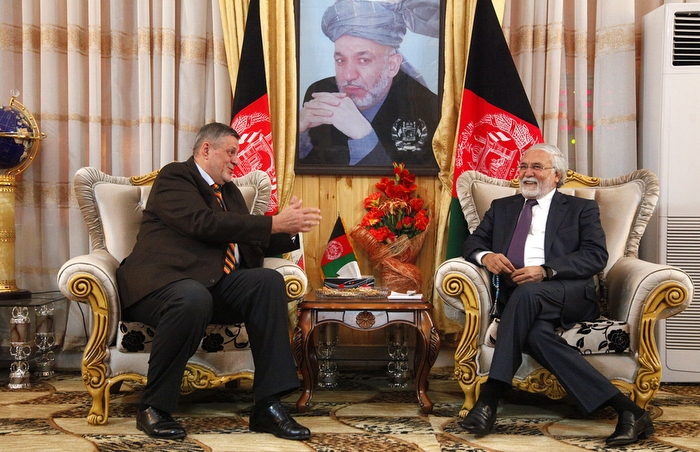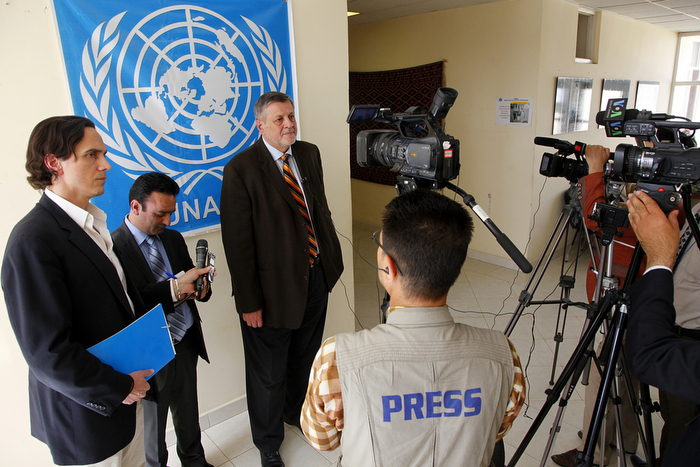KABUL - Ahead of the second round in Afghanistan’s Presidential elections, the top United Nations official in the country today reaffirmed the world body’s commitment for the coming years and urged all Afghans to take part in the vote to help shape their country’s future.The Secretary-General’s Special Representative for Afghanistan, Ján Kubiš, made the comments while on a visit to the western province of Herat, the latest in a series of visits carried out by the envoy and his deputies with the aim of getting first-hand impressions of how different provinces are preparing for the country's second round run-off in its Presidential elections, set to take place on 14 June, as well as discussing other matters, such as security, development and UN assistance.
The envoy’s meetings included one with the Provincial Governor, Sayed Fazlullah Wahidi.
“We discussed our future cooperation and partnership – between the United Nations and the province, the authorities and the people of the province – for many years into the future. And given the fact that by the end of 2016, all the international forces will leave the country, and with that, perhaps we will see less exposure of the international community here, I wanted to deliver one message: the United Nations is here to stay, and we would like to use this as an opportunity to be of even more support and assistance to the people of Afghanistan for the years to come,” Mr. Kubiš said in a later press encounter.
“This brought us back to the basics – for this, we need good, quality elections. We need a new government that will come based on the votes of the people and that will represent the majority of the people in the country,” he added. “Therefore, it is important to conduct the run-off in the best possible way and in the most secure environment – in such a way that will give a chance to the majority of the people to come and vote. And I would like to encourage people to indeed use this opportunity to shape the future of the country and come and vote in the run-off of the Presidential elections.”
Mr. Kubiš’ other meetings included the local heads of the Independent Election Commission (IEC), Dawood Sediqzaad, and the Independent Electoral Complaints Commission (IECC), Abdullah Shirzai, with whom he discussed the upcoming run-off, and Herat’s Provincial Chief of Police, Major General Samiullah Qatra.
“This is not the first time that I am visiting Herat, but I find this visit very timely, notably because of the importance of the province and the city of Herat for all the transition processes that are going on in the country,” Mr. Kubiš said.
Afghanistan is going through political and security transitions. On 5 April, Afghanistan held Presidential and Provincial Council elections. The Presidential elections, which mark the first-ever transfer of power from one elected president to another in the country’s history, are now in a run-off stage after none of the candidates in the April vote achieved the 50 per cent plus one result needed to win in the first round. Two leading candidates from that round, Dr. Abdullah Abdullah and Dr. Ashraf Ghani Ahmadzai, will compete in the second round.
The political transition coincides with security transition with the Afghan forces taking over full security responsibility from their international partners, who are ending their combat mission at the end of this year.
Furthermore, on Tuesday, the President of the United States, Barack Obama, announced that the number of US troops serving as part of the international security forces in Afghanistan would be reduced to 9,800 by the end of 2014, with the last US troops withdrawn by the end of 2016.
“And, of course,” Mr. Kubiš continued, “we discussed issues such as how to provide a secure environment for the elections, it’s a major question, but also how to learn from the lessons of the first round and certain deficiencies and imperfections, so as to make sure that when people go to vote – and I hope that people will go to vote – that their valid votes will all be counted and all the fraudulent votes will be disqualified.”
The UN Assistance Mission in Afghanistan (UNAMA), which Mr. Kubiš heads, has previously noted that that the process leading up to the elections represented an improvement over past votes. For the first time, the elections were conducted based on laws passed by the National Assembly rather than Presidential decree. They were, for the first time, fully Afghan-managed by the two independent electoral institutions, constituted on the basis of a formal consultative process set out in the new legislation.
The UN Mission has also acknowledged the efforts made by the IEC and IECC to increase transparency in polling, the counting of votes and the handling of complaints.
Mr. Kubiš echoed earlier calls stressing the importance of cooperation between the electoral institutions and candidates in the run-up to the second round run-off, in order to safeguard national unity and stability.
He urged both of the candidates to “engage in respectful campaign and that they will not use the ethnic card or any other divisive card in the (election) campaign” and called on them to urge their supporters not to commit fraud in their names.
“That would, in a way, harm their legitimacy in the eyes of the people,” he said.
In a statement issued after the announcement of the results of the first round of Presidential election, UN Secretary-General Ban Ki-moon also encouraged the two Presidential candidates to continue to respect the electoral process as it moves to a second round.
“The Afghan people have placed great faith in the candidates, the electoral institutions and the security forces to bring a peaceful political transition to the country. The Secretary-General encourages all parties to honour this trust,” Mr. Ban’s spokesperson said in the statement.
[Click here for the transcript of Mr. Kubiš' press encounter in Herat]








